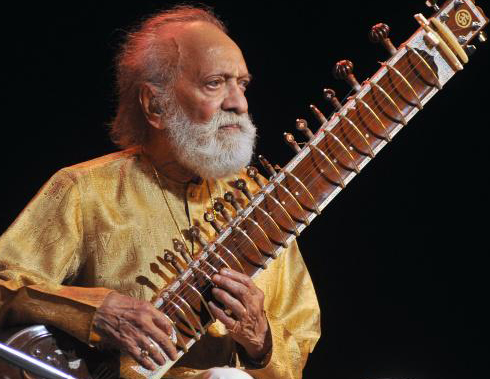
The legendary musician and composer was India's musical ambassador and a unique phenomenon in the classical music worlds of East and West. He was well known for his pioneering work in bringing Indian music to the West.
He was active as a professional musician till the end and was one of the contenders for the next Grammys. Details awaited.
"Music is the soul of India. It has always been my life as well"

(This is aprofile of the Sitar Maestro published on the occasion of his 90th birthday in 2010)
"Music is the soul of India. It has always been my life as well," said the composer musician in a letter read out at the event "Ravi Shankar, 90 not out" organised by the Indo-American Friendship Association in association with the Indian Council of Cultural Relations here late last evening.
"As a young Indian in the 1950s it was a matter of pride to see somebody like Panditji perform on the world stage and reach out across to those like Yehudi Menuhin and the Beatles," said Maharaj Gaj Singh II of Jodhpur.
"We owe his contribution to the world of music," said Singh who studied at Oxford. Singh was joined by others like German ambassador Thomas Matussek, French ambassador Jerome Bonnafont, dancers Pandit Birju Maharaj and Sonal Mansingh at the event chaired by Abid Hussain, fromer envoy to the US.
Born in Varnasi on April 7, 1920, Pandit Ravi Shankar began performing at the age of 11 after being initiated into music and dance a year earlier by his eldest brother, Uday Shankar. As a young boy, Ravi Shankar toured Europe with his brother's dance troupe and at the age of 18 he began to learn how to play the sitar from his guru Baba Allauddin Khan.
After almost seven years of rigorous study in the ancient gurukul system, Ravi Shankar started composing film music, founded the Indian National Orchestra and worked as a music director for All India Radio. In the 50s and 60s, he taught and performed sitar concerts in the largest halls all over Europe and the Americas popularising ragas and other elements of Indian classical music.
"There was no language barrier as I was very fluent in English and also in French and I could explain our music and the various intricacies of ragas and Talas", said Ravi Shankar in his letter.
"Pandit Ravi Shankar was not only a great musician himself but he transcended and took Indian music to the world and became an icon to so many," said ICCR president Karan Singh at the function here last evening.
The sitarist and composer had pioneered the tradition of experimenting India's classical music fusion with western culture and performed with western classical violinist Yehudi Menuhin and Beatles star George Harrison.
"George Harrison became my student in the mid sixties, which certainly opened up the biggest door in all the continents for me. George was one whom I loved very much as he was so deeply attracted to our music and the Vedic culture and traditions of India," said Ravi Shankar.
"The passion of Panditji was an inspiration for everyone. It has a delight to see how the expression of every note was glimpsed in his eyes," said Kathak dancer Birju Maharaj who came to Delhi in 1953 at the age of 14 years as a teacher at the Sangeet Bharati and was a frequent visitor to Ravi Shankar's house.
One of the first musicians to write sitar music in Indian notations for western concertos, Pandit Ravi Shankar was nominated to the Rajya Sabha in 1986. The musician was conferred the Bharat Ratna, in 1999 and he also won three Grammy awards and was given the Ramon Magsaysay award in 1992.
"I have loved many countries like France, England, and Japan of which I have several fond memories, but I deeply fell in love with the US from my first visit there in 1932 with Dada Uday. The variety of people from all over the world, and their love for all types of music, dance, films, innovation, creation, and the spirit of freedom attracted me the most.
"Though my first home is New Delhi and I am a citizen of India, my other home is in Encinitas near San Diego, California, which I love," said Ravi Shankar who added that he was "an aspirant to live '101 all out!".
The function felicitating the musician culminated with a sitar recital of a composition in Satyajit Ray's film "Panther Panchali" by Ravi Shankar's disciple Shubhendra Rao with tabla accompaniment by Delhi-based Akram Khan. It was folowed by a bharatnatyam performance by Nehha Bhatnagar.








Comments
Add new comment